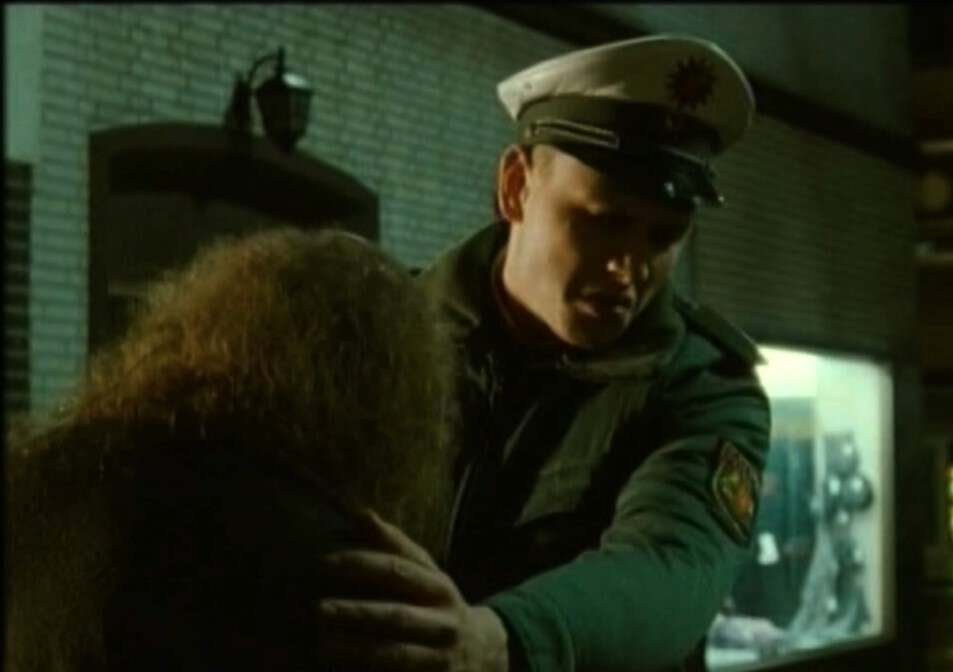Freedom and Nothingness
Savaş Ceviz and Article 2 of the German Constitution
In a cooperation project (GG19) from 2007, various directors produced a series of films corresponding to the first 19 articles of the German Constitution (Imdb, 2023). Unsurprisingly, Savaş Ceviz dedicated his film to Article 2: Freedom. For people living outside of German who are unfamiliar with German law, it’s especially worthwhile to take a closer look at what is actually written there.
(1) Every person shall have the right to free development of his personality insofar as he does not violate the rights of others or offend against the constitutional order or the moral law.
(2) Every person shall have the right to life and physical integrity. Freedom of the person shall be inviolable. These rights may be interfered with only pursuant to a law.
The narrative of the 6-minute film by Savaş Ceviz is told rather quickly. In a police car, two older police officers go on patrol together at night with Ceviz's friend, Max Riemelt (Sense 8, Matrix 4), who also plays a police officer and who is dozing off in the back seat. The two older colleagues want to mess around with Max and stop when they see a disheveled, old homeless man (Axel Neumann) who has placed his belongings in two bags next to him. Max is asked to carry out an identity check. He balks and is clearly disgusted at the sight of the homeless man and hesitantly begins to examine him. He unbuttons his jacket and the camera points to the wet stain on his crotch. Reaching into his pocket, he angrily states, "Fucking shit, don't you even put your underpants on?" A passer-by walks by and then says: "Why don't you just leave the man alone? He won't hurt anyone." Max finally examines his bags and finds an old leather wallet. He says: "It's completely empty," to which the man replies: "I don't need any money - I'm free." Max packs all the things back into the bags and buttons up the homeless man's jacket. With the two other police officers, he quietly walks away. The last shot of the camera shows the old man standing alone in the dark, quite lost.

This sujet (of an identity check) has also been explored by other directors extensively, as evidenced in the recently released Netflix and Oscar-winning film, "Two Distant Strangers" by Dazu Free and Martin Desmond Rom, in which there is an endless iteration in forever new variants, in which a black man encounters a white policeman in the morning after leaving his girlfriend's apartment. A similar treatment of this theme also occurs in the film by Stefon Bristol "See You Yesterday," which was produced by Spike Lee.
Back to the film “Freedom,” in which racism is more of a subtext because a scene is portrayed involving two white men. Judith Butler writes, "In Althusser's concept of interpellation, the acclamation or address by which a subject is constituted emanates from the police. There is a police officer who not only embodies the law, but whose shout of 'Hey there!' has the effect of associating the law with the one addressed” (2021[1993]:173).
The subject is raised to the status of the subject, which establishes existence and, here and everywhere else in the world, it consists of a identity card. Passport control has a controversial history in Berlin because freedom of movement in a city like Berlin was long determined by two different nationalities and thus there existed two different passport controls. During the Cold War, people from the East and the West could get to the other half of the city by using a day pass.
Butler goes on to write: "The subject is not only recognized, but also achieves a certain order of social existence." (ibid.). This goes hand in hand with fear, the fear of losing one’s social existence and thus recognition. In this film, shame and fear are written all over the homeless man's face. There is no outside, no outside of the law. The greatest possible freedom is subject to the law.

If we abstract from this even further and turn to Hegel, then a new dimension is added. Hegel writes in his Encyclopedia: "The highest form of nothingness would be freedom, but it is negativity insofar as it delves into itself to the highest intensity and is itself, and indeed is absolute, affirmation." (Hegel, 1970[1830]: 187).
The homeless man has renounced everything, more or less voluntarily, but we don't learn anything about that in the film. It is the negation of property and money. It is nothingness. In this nothingness, can one really be free there? In the negation of what already exists, in the negation of property, there is also an affirmation of what happens if we are to believe Hegel. In this film by Savas Ceviz, nothing is not nothing. It is nothing and the ID-card. Even though the policeman is nicely cast by Max Riemelt, who was still young at the time, Ceviz nevertheless presents a confrontation here. A confrontation between withdrawing from society in the homeless person and asserting oneself as a citizen.
Instead of propagandizing a Western aesthetic, which Godard incidentally always opposed, Ceviz reverses the beautiful and the ugly. The ugly - the homeless man – comes across as the beacon of hope for the viewer. His form of freedom becomes desirable but must nevertheless be negated. It is a freedom that transcends consumption as well as one that goes beyond regarding humans from a consumeristic perspective, which has become a fad in Berlin. It is a freedom transcending property as well as the compulsive desire for having that has become conceivable here. Seen in this perspective of hope, Max looks inhuman for furiously attacking the homeless man's dignity. Or should Max Riemelt just save the homeless man, in this case Savas Ceviz's self-object, from his own sense of freedom? ;-)
Bibliography:
Bundesministerium der Justiz (2023). Grundgesetz. https://www.gesetze-im-internet.de/gg/BJNR000010949.html (accessed 01.07.2023)
Butler, J. (2021). Körper von Gewicht. edition suhrkamp.
Hegel, (1970[1830]). Enzyklopädie der philosophischen Wissenschaften. Suhrkamp.
Imdb (2023). GG19.
https://www.imdb.com/title/tt0831854/plotsummary/?ref_=tt_ov_pl (accessed 10.06.2023).
All photos: copyright Savaş Ceviz (GG19)
Write comment
Your email address will not be published. Comments are published only after moderation.
Comments ()